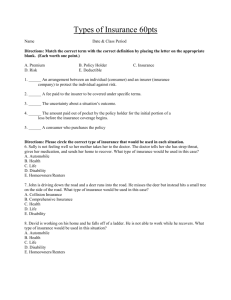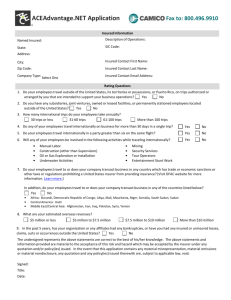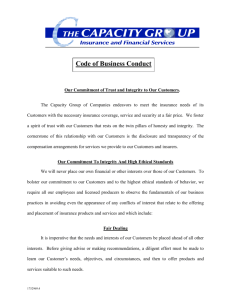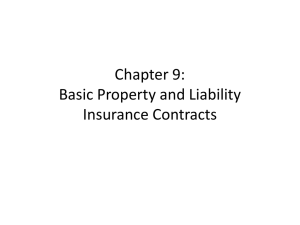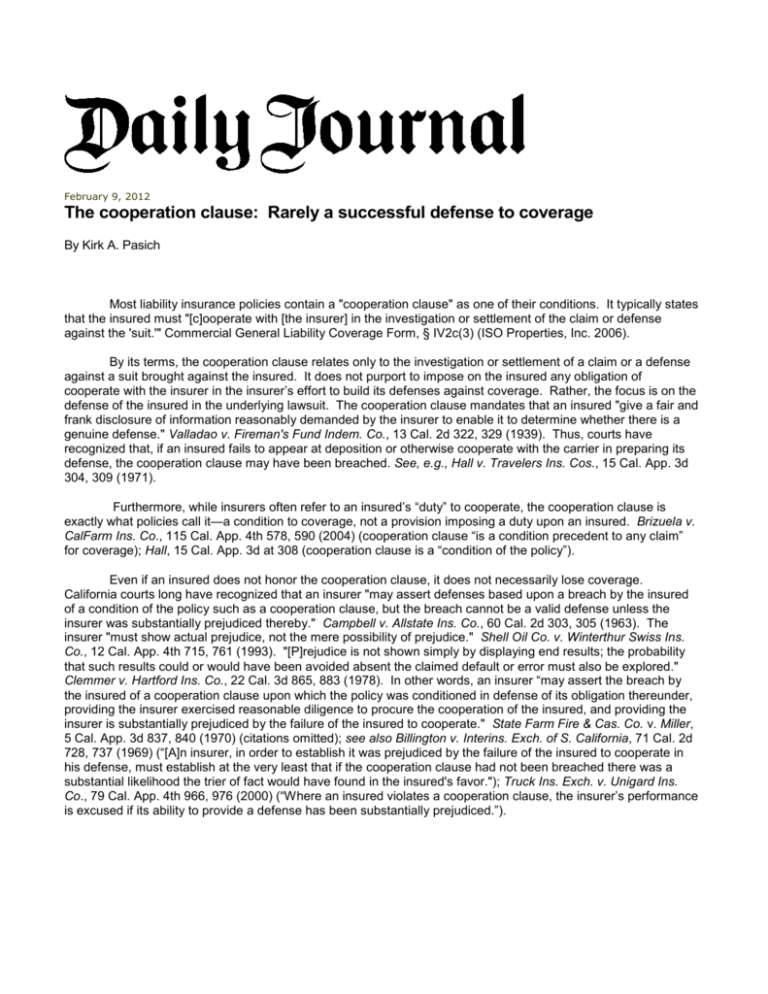
February 9, 2012
The cooperation clause: Rarely a successful defense to coverage
By Kirk A. Pasich
Most liability insurance policies contain a "cooperation clause" as one of their conditions. It typically states
that the insured must "[c]ooperate with [the insurer] in the investigation or settlement of the claim or defense
against the 'suit.'" Commercial General Liability Coverage Form, § IV2c(3) (ISO Properties, Inc. 2006).
By its terms, the cooperation clause relates only to the investigation or settlement of a claim or a defense
against a suit brought against the insured. It does not purport to impose on the insured any obligation of
cooperate with the insurer in the insurer’s effort to build its defenses against coverage. Rather, the focus is on the
defense of the insured in the underlying lawsuit. The cooperation clause mandates that an insured "give a fair and
frank disclosure of information reasonably demanded by the insurer to enable it to determine whether there is a
genuine defense." Valladao v. Fireman's Fund Indem. Co., 13 Cal. 2d 322, 329 (1939). Thus, courts have
recognized that, if an insured fails to appear at deposition or otherwise cooperate with the carrier in preparing its
defense, the cooperation clause may have been breached. See, e.g., Hall v. Travelers Ins. Cos., 15 Cal. App. 3d
304, 309 (1971).
Furthermore, while insurers often refer to an insured’s “duty” to cooperate, the cooperation clause is
exactly what policies call it—a condition to coverage, not a provision imposing a duty upon an insured. Brizuela v.
CalFarm Ins. Co., 115 Cal. App. 4th 578, 590 (2004) (cooperation clause “is a condition precedent to any claim”
for coverage); Hall, 15 Cal. App. 3d at 308 (cooperation clause is a “condition of the policy”).
Even if an insured does not honor the cooperation clause, it does not necessarily lose coverage.
California courts long have recognized that an insurer "may assert defenses based upon a breach by the insured
of a condition of the policy such as a cooperation clause, but the breach cannot be a valid defense unless the
insurer was substantially prejudiced thereby." Campbell v. Allstate Ins. Co., 60 Cal. 2d 303, 305 (1963). The
insurer "must show actual prejudice, not the mere possibility of prejudice." Shell Oil Co. v. Winterthur Swiss Ins.
Co., 12 Cal. App. 4th 715, 761 (1993). "[P]rejudice is not shown simply by displaying end results; the probability
that such results could or would have been avoided absent the claimed default or error must also be explored."
Clemmer v. Hartford Ins. Co., 22 Cal. 3d 865, 883 (1978). In other words, an insurer “may assert the breach by
the insured of a cooperation clause upon which the policy was conditioned in defense of its obligation thereunder,
providing the insurer exercised reasonable diligence to procure the cooperation of the insured, and providing the
insurer is substantially prejudiced by the failure of the insured to cooperate." State Farm Fire & Cas. Co. v. Miller,
5 Cal. App. 3d 837, 840 (1970) (citations omitted); see also Billington v. Interins. Exch. of S. California, 71 Cal. 2d
728, 737 (1969) (“[A]n insurer, in order to establish it was prejudiced by the failure of the insured to cooperate in
his defense, must establish at the very least that if the cooperation clause had not been breached there was a
substantial likelihood the trier of fact would have found in the insured's favor."); Truck Ins. Exch. v. Unigard Ins.
Co., 79 Cal. App. 4th 966, 976 (2000) (“Where an insured violates a cooperation clause, the insurer’s performance
is excused if its ability to provide a defense has been substantially prejudiced.”).
This is because a condition does "not to provide a technical escape-hatch by which to deny coverage in
the absence of prejudice nor to evade the fundamental protective purpose of the insurance contract to assure the
insured and the general public that liability claims will be paid." Ins. Co. of Pennsylvania v. Associated Int’l Ins.
Co., 922 F.2d 516, 523 (9th Cir. 1991) (citation omitted)
Furthermore, "an insurer is not allowed to rely on an insured’s failure to perform a condition of a policy
when the insurer has denied coverage because the insurer has, by denying coverage, demonstrated performance
of the condition would not have altered its response to the claim." Select Ins. Co. v. Superior Court, 226 Cal. App.
3d 631, 637 (1990); see also Ins. Co. of the State of Pennsylvania v. Roman Catholic Archbishop of Los
Angeles, Case No. CV 05-0587-NM (MCx), Slip op. at 10 (C.D. Cal. May 13, 2005) (“[C]ourts are naturally
skeptical of an insurance company that argues both that the underlying claims are not covered and that the
insured has breached the duty to cooperate.” (relying on Select)), aff’d, 227 Fed. App’x. 643 (9th Cir. 2007).
These principles hold true even if an insurer has not formally denied coverage. See, e.g., Flintkote
Co. v. Gen. Accident Assurance Co. of Canada , 480 F. Supp. 2d 1167, 1176 (N.D. Cal. 2007) (“While [the insurer]
never explicitly denied claims prior to 1996, its decision to ‘not respond[ ] to [the insured’s] notice documentation’
is, for the purpose of waiver, the same as denying coverage.”).
Finally, even if an insurer believes that an insured has failed to cooperate, it is not entitled to seek judicial
relief until the underlying lawsuit against its insured has been resolved:
Logically, the required showing of prejudice cannot be made while the main tort
action is still pending, it's outcome uncertain. . . . To permit speculation at this
stage as to whether the insurer may or will be prejudiced in the main tort action
would be inconsistent with the requirement laid down by our Supreme Court that
the insurer must prove prejudice in order to assert the insured's lack of
cooperation as a defense against the insured persons.
United Servs. Auto. Ass’n v. Martin, 120 Cal. App. 3d 963, 966 (1981).
Given these standards, an insured's alleged failure to cooperate will not often be a successful defense to
coverage. Furthermore, even if the claim may have some merit, there must be substantial prejudice, something
that is difficult for an insurer to prove and something that an insurer cannot prove while the lawsuit against its
insured is pending.
Kirk A. Pasich is a partner in the Los Angeles office of Dickstein Shapiro. He represents insureds in complex
coverage matters and is the leader of the firm's insurance coverage practice.
**********
© 2012 Daily Journal Corporation. All rights reserved.



